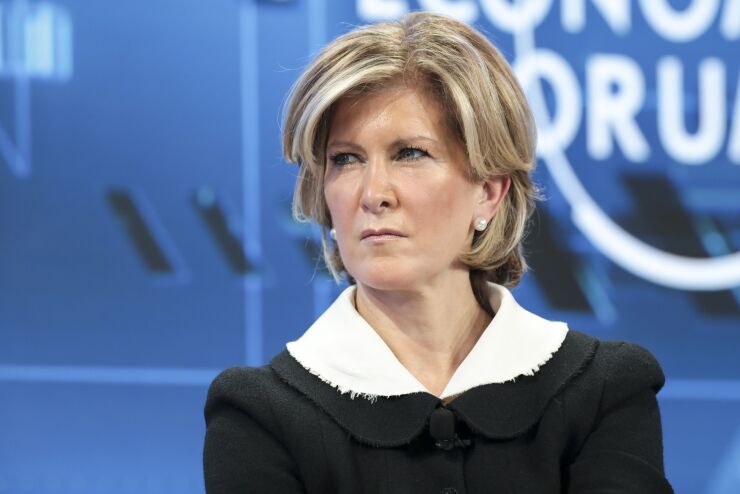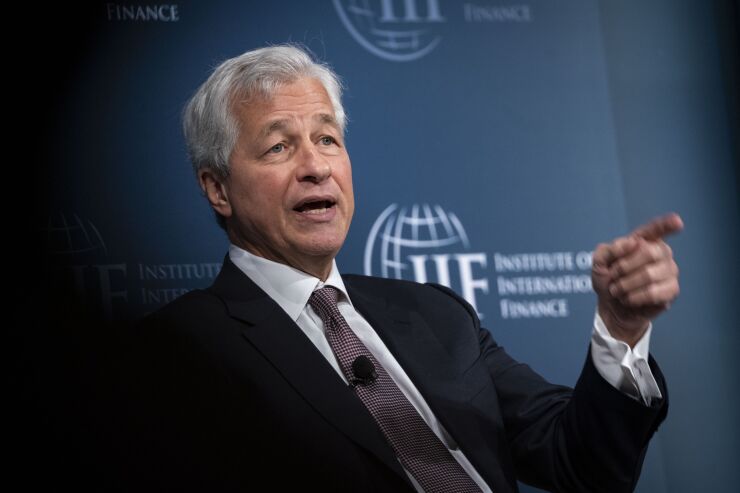Wall Street banks compete ferociously with each other to entice star wealth managers with ultra-rich clients to jump ship and work for them. JPMorgan Chase allegedly brings that warfare in-house, pitting its own financial advisors against its own private bankers in a Hunger Games-style competition for control over lucrative clients, a new lawsuit claims.
Over nearly two years, the bank wooed
But soon after Campbell arrived at the San Francisco branch of J.P. Morgan Securities, now known as J.P. Morgan Advisors, with her trophy roster in October 2020, she alleged she had to fend off behind-the-scenes attempts by J. P. Morgan private bankers to poach her customers, who include professional athletes, a Forbes 400 billionaire and the family trust of the billionaire founder of a private equity firm.

Campbell’s lawsuit, filed on Dec. 2 in federal district court in San Francisco, alleged breach of contract, fraudulent misrepresentation and violation of labor and anti-discrimination laws, among other claims. Court documents said she would “in the near future” begin mandatory arbitration as required by her employment contract. Campbell, who still works at J. P. Morgan, also filed for a temporary restraining order to prevent the bank from moving client assets out of her clients’ portfolios without her knowledge or consent.
Her lawsuit aims to pull back the curtain on alleged squabbling and back-stabbing inside one of Wall Street’s most storied banks as it tries to build a first-class wealth management team for the mega-rich. Campbell’s filing alleged an institutionalized “shark tank” in which more than
‘Hire and poach’
The complaint alleged that Campbell is “a victim of a hire-and-poach ‘Playbook’ that is known within J.P. Morgan to be a consequence of the internal conflict between” J.P. Morgan Advisors (Campbell’s unit) and the private bank. Private bankers, the lawsuit alleged, would solicit advisors’ clients with cheaper loans and insider access to deals, and “siphon off” assets managed by advisors. J.P. Morgan Advisors is a tiny part of the bank’s wealth management division, which
Campbell’s lawsuit said that despite “explicit contractual promises” by J. P. Morgan that her clients “would not be poached by other groups” at the company, the private bank began “ruthlessly soliciting her clients, disparaging her” and redirecting her clients’ assets to the private bank.
J. P. Morgan quickly fired back. In a legal filing on Dec. 3, it denied that it had promised never to pitch private bank services to Campbell’s clients. “Maintaining the nature of a relationship is not the same as a promise to never engage with clients on new business,” the bank’s Dec. 3 filing said. Campbell, it said, “shows no evidence that any of her clients have affirmatively requested to be excluded from any opportunities that the Private Bank or other divisions of J. P. Morgan may offer.”
In its filing, the bank accused Campbell of trying “to extort a settlement.” Campbell, it said, had not lost any clients or net assets under her management and continues to “quarterback” investments for her star pro athlete client, identified by the FT as Rodriguez. The bank called Campbell’s “frequent unresponsiveness to her J. P. Morgan colleagues” the source of “much of her frustration and confusion.”
J. P. Morgan spokeswoman Veronica Navarro Espinoza said in an emailed statement Sunday that Campbell’s claims “have no merit and we look forward to presenting the facts to the Court.” She added that Campbell “did not lose any clients while working here” and that “all our clients have access to our world class solutions platform and the choice of the advisor they want to work with.“
The 2020 Super Bowl party
What’s clear is that J.P. Morgan’s private bank makes concerted efforts to woo highly-paid athletes and celebrities, wherever they are.
One technique, according to Campbell’s lawsuit: Pay a star professional athlete to speak at
Jennifer Selendy, a lawyer for Campbell in New York, said in a written statement on Sunday that J. P. Morgan “recruited (Campbell) from Merrill Lynch last year under false pretenses, froze her out of deals, defamed her to clients and has been cannibalizing the $1.1 billion in assets under her control, in violation of her employment contract.” Selendy added that “in the complaint, Ms. Campbell describes an environment in which senior leaders at J.P. Morgan lure advisors like Campbell who have billion-dollar portfolios and bold-name clients with promises to support and grow their business, only to systemically poach clients and move their assets over to the private bank.” Advisors, Selendy wrote, “have little recourse to fight back.”
Channel conflict on steroids?
Most Wall Street banks are plagued by so-called “channel conflict,” in which different divisions of advisors (brokers) and private bankers all compete for the same customers, even if they’re already clients.
J.P. Morgan’s private bank offers many services that overlap with those offered by the advisors’ group, namely investment advisory and lending services. Because of the different ways in which J. P. Morgan compensates advisors and private bankers, the latter have incentives to try to wrestle clients’ assets away from advisors and to the private bank.
J. P. Morgan typically pays advisors a salary plus commissions or share of revenue based on the products and transactions they arrange for their clients, along with bonuses. Advisors, who spend years cultivating relationships and building trust and goodwill with their clients, receive commissions or shares of the revenues based on the financial products that they sell or transactions they arrange for their clients. Like its competitors, J. P. Morgan expects its advisors to join with their own roster of customers.
In contrast, private bankers aren’t expected to generate their own business from scratch. They’re typically paid less than advisors but can earn bonuses by bringing new clients into the private bank.
“Channel conflicts are really hard to mitigate, because you have very large organizations where oftentimes the hand doesn’t know what the foot is doing,” said Louis Diamond, the president of Diamond Consultants, a financial advisor recruiting and M&A advisory firm in Morristown, New Jersey. “When you have professionals incentivized to do their jobs, that’s what’s going to prevail.”
Wooing a star advisor
Campbell, a Harvard Business School graduate, began
In mid-2008, a fed-up Campbell bailed on UBS to join Merrill Lynch as a managing director in its elite private banking and investment group. The timing was horrid: Three weeks after she joined the company, Merrill Lynch nearly collapsed due to the financial crisis and was bought by Bank of America. Still, Campbell stayed at the bank for a decade and flourished, with John Thiel, then the bank’s head of wealth management, installing her on the powerful “advisory council to management.” Her book of business grew to 40 trophy clients with 400 accounts holding $1.1 billion. Her team generated annual revenues of more than $4 million, Barrons
J. P. Morgan, whose Gilded Age namesake founder was 19th-century industrial and financial baron John Pierpont Morgan, took notice.
By July 2019, the bank’s San Francisco regional director, Steve McCashin, persuaded Campbell to take all-day meetings in New York with senior J. P. Morgan executives, including the head of banking and lending at J.P. Morgan Wealth Management (the division under which advisors sat) and David Frame, the current CEO of the private bank. Campbell wanted to make sure that Frame’s private bankers wouldn’t try to poach her clients. McCashin reassured her, telling Campbell that while private bankers “are often fueled by the prestige and power within the firm of having ‘ownership over relationships with high-profile individuals,'” that conflict wouldn’t happen with her, according to the complaint.
The courting increased. At the 2020 Super Bowl party, Campbell met Mary Erdoes, one of J. P. Morgan’s highest-ranking executives, who encouraged her to ditch Merrill Lynch and come over. Erdoes is

It took more than a year for Campbell, a single mother, to decide to leave Merrill Lynch. She wanted rock-solid guarantees of no poaching. Her young son had health issues requiring frequent blood transfusions and home schooling and her young daughter was hearing impaired. Her Merrill Lynch retirement package, based on 180–200% of her more than $4 million in annual revenues, would fully vest in just two more years. The COVID pandemic had exploded in early 2020.
A ‘comedy of errors’
By June 2020, J. P. Morgan began sending her draft employment contracts. Campbell’s lawsuit alleged that it took the bank several stabs to get basic factual details correct, including her start date and a “side letter” that Campbell insisted upon regarding no poaching and working from home. But when she started her new job as a managing director on Oct. 21, 2020, her onboarding was “a comedy of errors,” according to the complaint.
Her lawsuit said that the bank required that her signed offer letter be notarized, something that didn’t happen until eight months later. A seven-figure forgivable personal loan — Wall Street’s golden handcuffs — that the bank gave her had incorrect dates. Still, McCashin, her direct manager, was ecstatic. Campbell had brought over her tiny Merrill Lynch team and nearly all of her clients — an immediate infusion of $1.1 billion in assets and $270 million of loans. Kristin Lemkau, the CEO of J.P. Morgan Wealth Management, told Campbell that with her move, she had brought in more assets in a week than all other roughly 450 advisors combined, the complaint said. Rodriguez, known as A-Rod, made more money playing Major League Baseball player than any other player, around $455 million,

Back at its Madison Avenue headquarters in New York, CEO Jamie Dimon praised Campbell’s hiring as “important” for the financial institution, which lags behind UBS, Credit Suisse, Morgan Stanley and Bank of America’s Merrill Lynch in managing money for the super affluent, the lawsuit alleged. Still, other senior executives, including Sieg and Lemkau, who oversees Sieg’s division, said they were powerless or unwilling to stop the private bank’s incursions because they didn’t want to “risk the political fight,” the lawsuit asserted.
‘Surreptitious pilfering of assets’
On December 15, 2020, Campbell alleged that the private bank emailed one of Campbell’s star clients a pitch book of private equity funds. She said she wasn’t cc’d on the email.
The private bank continued what Campbell alleged were “high-pressure sales tactics,” with Vince La Padula, the global head of lending, deposits and custody, telling one of Campbell’s clients, identified in the complaint as "Pro Athlete Client" and by the FT as Rodriguez, that he should “drop Campbell’ and move his money to the private bank. La Padula separately told Campbell that she was “a no-one” and would have a “bad outcome” at the firm if she tried to arrange a loan for Rodriquez without “partnering” with the private bank, the complaint alleged.
Upset and confused, according to the lawsuit, the client told Campbell about the “back channel efforts.” When Campbell tried to arrange a $50 million loan for a pro athlete client last May, she alleged that she was shut down by unnamed executives. Meanwhile, the private bank sent the client a loan term sheet. When the private bank’s sports finance group finally issued the loan last June, it was weeks late and had forced the client to scramble to sell stock to meet a deadline to buy a minority stake in a sports franchise for which he needed the loan. Also bad: the loan was secured by assets under Campbell’s management. Campbell alleged that she had no idea what the loan’s rate or terms were because the private bank refused to tell her. In its Dec. 3 filing, J. P. Morgan said that although Campbell did not work on the loan, the bank nonetheless awarded her a 0.1% commission, or $5 million, on it — a figure Campbell alleged was low.
Advisors like Campbell are typically paid a chunk of the revenues, sometimes as much as 50%, on loans they originate for clients. Campbell’s complaint alleged the private bank would make nearly 50 times that amount on the annual interest of loan to the client.
Campbell alleged that she had complained to top executives about private bankers and Erdoes meeting with her clients. But she alleged she was told by one senior executive that Erdoes was “simply too powerful, and the plan for J. P. Morgan Advisors was to try to survive until she was gone.”
It’s not a fun work environment right now for Campbell, for sure. The irony: According to J. P. Morgan’s Dec. 3 court filing, the last two months have been Campbell’s “best for revenue generation in her entire tenure with the bank.”
Editor's note: This story has been updated to reflect a Dec. 3 Financial Times report that identified Alexander Rodriguez as a client.









